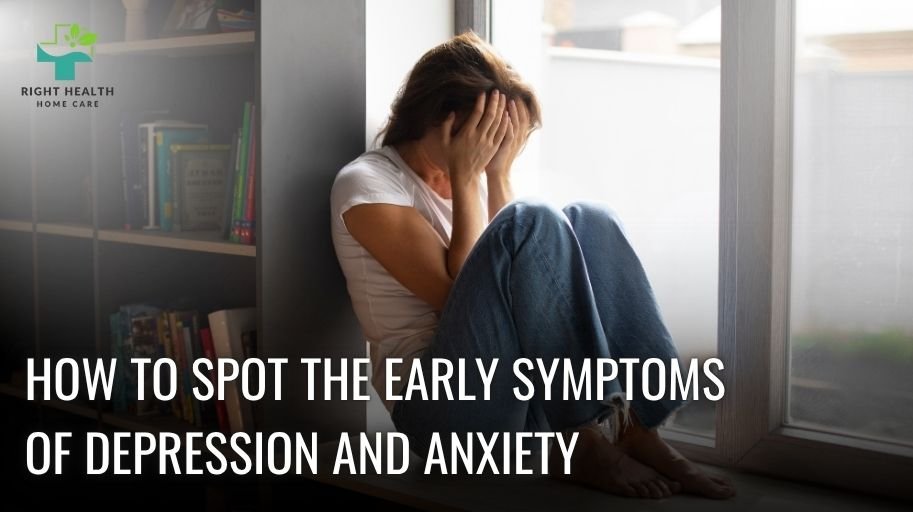How to Spot the Early Symptoms of Depression and Anxiety
Mental health isn’t a luxury it’s a fundamental human right. Mental health care should be available to everyone, yet all too often, disorders like anxiety and depression are ignored or ignored. Maintaining each person’s dignity and right to health in a society where mental health problems have the power to transform lives depends on early detection and timely support.

Identifying the Significance
Depression and anxiety are more than just passing emotions or symptoms of weakness. These are actual, curable mental health issues that affect millions of people globally. Being able to identify the first symptoms is an essential human right since it enables people to get services, seek assistance, and live with dignity and support instead of going through suffering in silence.
Recognizing the Situation
Although they can co-occur, anxiety and sadness are different in nature:
- Anxiety is excessive, persistent concern or fear that gets in the way of day-to-day activities.
- Depression is characterized by pessimism, indifference, and a persistently low mood.
- These are not personal shortcomings or defects in character. These are medical disorders that call for comprehension, compassion, and the right kind of care—rights that all people have.
Early Signs of Anxiety
- Constant Fear or Worry
Anxiety may be suggested when worry becomes difficult and chronic. This is a crippling panic that keeps you from achieving anything, not your typical dread.
- Restlessness or irritability
In addition to having trouble relaxing, people may regularly feel tense, easily startled, or on edge.
- Having Problems Focusing
Anxiety usually results in intrusive thoughts that cloud judgment and make it hard to stay focused.
- Sleep Disruption
Struggles with falling asleep, staying asleep, or experiencing restless nights can be strong indicators of anxiety.
- Physical Symptoms
Tensions, headaches, digestive issues, and a racing heart are all physical signs that are often ignored or misattributed.
Early Signs of Depression
- Persistent Sadness
A deep and lasting sense of emptiness, hopelessness, or despair lasting for more than a week.
- Loss of Interest
One of the main signs of depression is a sudden demise of interest in once-enjoyed activities or careers.
- Changes in Weight and Appetite
Unusual eating patterns or observable weight gain or decrease could indicate mental annoyance.
- Exhaustion and Low Energy
Even routine duties can become draining. Social disconnecting and a decline in life quality may result from this.
- Guilt or a sense of worthlessness
Depression can be caused by unfounded guilt, harsh self-judgment, or feelings of heaviness.
- Sleep Problems
Depression can cause excessive sleeping or insomnia, just as anxiety.
- Shared Symptoms
Since these conditions can overlap, some common indicators include:
- Emotional withdrawal or isolation
- Irritability or frequent mood changes
- Trouble making decisions
Unidentified pain or discomfort in the body
Ignoring mental health problems can lead to increased symptoms, reduced income, strained relationships, and in fatal situations. The right to fast action, protection from discrimination, and access to basic healthcare services—all essential components of the right to health—are guaranteed by early recognition, as per international human rights legislation. Everyone has the right to live with dignity, free from stigma, and to receive treatment when they need it, regardless of their background, identity, or financial status.
What to Do If You Notice the Signs
- Speak Up: No one should suffer in silence. Talk to someone you trust—family, friends, or colleague. Human connection can be a powerful form of support.
- Access Care: Every individual has the right to mental health services. Reach out to a healthcare provider, counselor, or community organization. Treatment and support should be available and affordable for all.
- Prioritize Well-being: Take care of your physical and emotional health. Exercise, proper nutrition, rest, and mindfulness practices are not luxuries, they are necessities that everyone deserves.
- Avoid Harmful Coping: Substance use, or other harmful behaviors often arise when support is absent. These are not solutions, they are signs of unmet needs. A human rights approach demands systems that support, not punish, those in pain
Conclusion
Mental health is a right, not a privilege. When anxiety and depression are identified early, people feel more empowered to seek therapy and regain control of their lives. Upholding human dignity requires eradicating stigma, ensuring access to care, and creating communities where mental health is not only recognized but championed.

